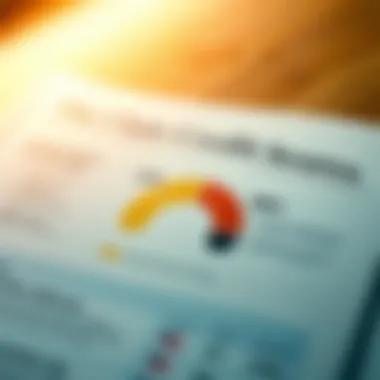Strategies for Getting a Credit Card with Bad Credit


Intro
Navigating the world of credit can feel like wandering through a maze, especially for those burdened by poor credit scores. It's a common tale; many folks find themselves in this position, whether due to unforeseen circumstances or simply a lack of financial literacy. Understanding how to acquire credit with a less-than-stellar score is essential—not just for immediate financial needs, but for laying a stable foundation for the future.
Poor credit can lead to inflated interest rates, higher fees, and limited access to credit options. However, knowing the landscape can turn that frown upside down. This article aims to shine a light on actionable strategies and dissect the types of credit cards available for those with credit challenges. The aim is not merely to provide information, but to empower readers to take control of their financial destinies, making informed decisions that can transform their creditworthiness over time.
Understanding Credit Scores
When it comes to navigating the often murky waters of credit acquisition, understanding credit scores is your life vest. For individuals grappling with poor credit, this knowledge not only sheds light on their current financial standing but also illuminates the path towards improvement. In this segment, we delve into what credit scores are, the components that shape them, and the tangible repercussions of falling short in this domain.
What Constitutes a Credit Score
At its core, a credit score is a numerical representation of one’s credit risk, typically ranging from 300 to 850. This three-digit figure arises from various pieces of information pulled from an individual’s credit report. Imagine it like a school report card, reflecting your performance over time -- your grades (or, scores) encapsulate your financial behaviors. Majorly, it encompasses:
- Payment History: A significant chunk of the score is derived here. Lenders scrutinize whether bills have been paid on time or if there have been late payments, defaults, and bankruptcies.
- Credit Utilization Ratio: This gauges how much credit you're using relative to your available credit. A high ratio, often seen as 30% or more utilized, can drag that score down.
- Length of Credit History: A longer credit history generally benefits the score, as it provides lenders with more information about how one manages credit over time.
- New Credit Inquiries: Each time you apply for new credit, a hard inquiry appears on your report. Too many inquiries in a short period can signal risk.
- Types of Credit Accounts: A mix of installment loans and revolving credit demonstrates the ability to manage different types of credit responsibly.
Factors Influencing Your Credit Score
The nuances of credit scores extend beyond the surface. Several key factors shape this figure, each playing a unique role:
- On-Time Payments: This is the golden rule. Consistently paying bills is undeniably the best way to beef up your score. One late payment can hang over your head like a dark cloud, impacting your score significantly.
- Credit Utilization: Keeping utilization below 30% of your total limit can play wonders for your score. A good tip is to pay off your balance before the statement date to ensure lower utilization is reported.
- Age of Credit Accounts: Patience pays off here. The longer you maintain accounts in good standing, the better it reflects on your score.
- Debt Levels: Excessive debt can raise red flags for lenders. Managing your debts diligently can also lead to a tangible improvement in your score over time.
- Credit Mix: Having various types of credit accounts, like installment loans and credit cards, can be beneficial. However, don’t rush to take out new loans simply for variety.
The Impact of Bad Credit
Encountering the unfortunate reality of a poor credit score can seem akin to wading through thick mud. The implications are tangible and can affect multiple facets of life:
- Higher Interest Rates: Individuals with a lower score are often faced with steeper interest rates on loans and credit cards. This direct correlation can lead to paying significantly more over time than someone with a better score.
- Limited Credit Options: It may feel like being locked out of opportunities. Many prime credit card offers are simply off the table for those with poor scores.
- Rental Applications: Landlords frequently check credit scores. A poor score here could jeopardize plans for securing housing.
- Insurance Premiums: Believe it or not, some insurers check credit scores when determining your premium rates. A lower score can result in higher costs.
- Job Applications: Certain employers look into financial histories as part of their hiring process, particularly for positions involving financial responsibility.
"Understanding your credit score allows you to unlock the potential of credit acquisition and take control of your financial future."
Knowledge is power, and having a clear understanding of the undertones of your credit score can empower you to make informed decisions regarding credit cards. Ultimately, as the first step in this journey, grasping what constitutes a credit score and its implications is indispensable for anyone wishing to improve their financial standing and secure better credit opportunities.
The Basics of Credit Cards
Understanding the landscape of credit cards serves as a cornerstone for anyone looking to enhance their financial standing, particularly for those grappling with poor credit scores. This section delves into the essential aspects of credit cards, offering insight into how they function, the benefits they offer, and the pitfalls that come with them. Learning the basics can help individuals make informed choices, paving the way to better financial health.
How Credit Cards Work
Credit cards are essentially tools that allow individuals to borrow money from a lender to make purchases. When one swipes a card, they are accessing a line of credit, which they must repay at a later date, often with interest if not handled wisely. One of their intriguing features is the grace period—this is a window where no interest is charged if the balance is paid in full by a specific date.
In working terms, it’s all about management. If you owe $1,000 on your card and your interest rate is 20%, you could end up paying much more over time. This is why, in the realm of poor credit, understanding these mechanisms becomes paramount. You have to think two steps ahead to avoid falling behind.
Advantages of Having a Credit Card
Despite the lurking concerns that come with credit cards, they bring about a myriad of advantages when utilized correctly, especially for those aiming to elevate their credit profiles.
- Credit Building: Regular, responsible usage and timely payments can lead to an improved credit score, which is the golden ticket to better financial options.
- Emergency Funds: Having a credit card is like having a safety net. When unexpected expenses arise, it can provide quick access to funds when cash is tight.
- Convenience: Credit cards simplify purchases. They eliminate the hassle of carrying cash and can be essential for online shopping.
- Rewards and Benefits: Many cards offer rewards such as cashback, travel points, or discounts, turning everyday spending into an opportunity to earn.
Yet, these benefits come with a responsibility; it’s vital to remember that just because you can use the card, it doesn’t mean you should max it out.
Risks Associated with Credit Cards
While credit cards can be double-edged swords, the risks cannot be overlooked. Navigating the fine line between use and misuse can be complex, but being aware of these hazards can help mitigate them significantly.
- High Interest Rates: Poor credit can mean sky-high interest rates. If a balance isn’t cleared, debts can balloon in no time.
- Inflated Debt: It’s easy to lose track of spending. A few swipe-happy days could unravel into a mountain of debt before you know it.
- Fees and Penalties: Late payments or over-limit spending can result in hefty fees, meaning what once seemed like a small financial advantage can quickly become burdensome.
- Impact on Credit Score: Inconsistent or improper use of credit cards can negatively affect your credit score, leading to a downward spiral of financial opportunities.
"It never rains, but it pours." Understanding the weather patterns of credit card usage can help you anticipate and prevent financial storms.
In summary, a well-rounded grasp of credit cards is vital for those seeking to better their circumstances. This knowledge not only prepares individuals for the decision-making process but also arms them with strategies to turn their poor credit situation into a learning experience. Careful management can lead to brighter financial futures.
Types of Credit Cards for Bad Credit


When you find yourself navigating the murky waters of credit acquisition with a less-than-stellar credit history, understanding the types of credit cards available to you becomes paramount. The right card can serve as a stepping stone towards rebuilding your credit score. It’s essential to comprehend the ins and outs of these products to make informed choices that will benefit your financial journey. With the right mindset and strategy, obtaining a credit card despite poor credit doesn’t have to be a daunting task.
Secured Credit Cards
Secured credit cards can be a lifeline for individuals striving to build or restore their credit. These cards require a cash deposit, which typically acts as your credit limit. The deposit reduces risk for the lender, making these cards more accessible for those with troubled credit histories. It’s common to see folks likening these cards to a safety net; they offer the chance to rebuild credit while limiting potential financial fallout.
While using secured cards, it’s vital to make on-time payments and utilize them responsibly, as positive behavior will start to reflect positively on your credit report. Just remember, this isn’t free money; it’s your own cash on hold. Utilizing your secured card takes discipline, but it can quite literally pave the way to better financial days ahead.
Unsecured Credit Cards
Unsecured credit cards, on the other hand, don’t require a cash deposit. However, they generally come with higher interest rates and fees, as lenders are taking on more risk by extending credit without collateral. For someone with poor credit, securing an unsecured card might feel akin to finding a needle in a haystack. Yet, there are options available.
Some organizations offer unsecured cards specifically tailored for individuals with poor credit. While it might be tempting to jump at the first offer, be sure to read the fine print. Hidden fees and APR can sneak up on you, causing complications down the road.
Retail Credit Cards
Retail credit cards represent another avenue for those grappling with poor credit. Often issued by specific stores, these cards can be easier to obtain than general unsecured credit cards. However, tread cautiously here. They usually come with high-interest rates and can only be used at the specific retailer.
Rewards and discounts can be enticing, and they can help establish a credit history if used wisely. But, if you’re thinking about applying for one, ask yourself if you’ll be able to manage the costs without letting your budget spiral out of control. Retail cards can be helpful, but they can also become a burden if not handled carefully.
Credit Builder Cards
Last but not least are credit builder cards. Designed specifically for those looking to bolster their credit scores, these cards typically feature lower limits and occasional fees. While they aren't necessarily secured cards, they work by allowing individuals to make small purchases, which they pay off in full every month. This strategy builds credit without accruing debt.
Many folks might overlook credit builder cards, thinking they don’t offer enough utility. However, they serve as an important tool in the purse of financial literacy. When used shrewdly, they can significantly contribute to improving one's credit profile, making it easier to transition into more advantageous credit options in the future.
By understanding these types of credit cards, it's possible to take proactive steps toward regaining financial stability. With each payment you make, you’re chiseling away at that rock of poor credit history, gradually reshaping it into something more favorable for your future.
Preparing to Apply for a Credit Card
When grappling with a poor credit score, getting a credit card might feel daunting. However, adequate preparation can make all the difference between landing a card or getting stuck in the mud. This section brings to light the significant steps one should take before applying, each tailored to ease the path for those with less-than-stellar credit histories.
Checking Your Credit Report
Under the hood of your credit score lies your credit report. It's absolutely crucial to check it before diving into applications. Why? For starters, your credit report helps in identifying errors that could be dragging your score down, perhaps unjustly so. A study by the Federal Trade Commission noted that around 20% of consumers find inaccuracies in their reports. These errors can give lenders a misleading impression of your creditworthiness.
Begin by requesting a free copy of your credit report from AnnualCreditReport.com. Review it like you would a novel: closely and critically. Look for late payments that you’ve resolved or accounts that don’t belong to you. Getting these sorted out might just boost your credit score a notch or two, making you a more appealing candidate for that credit card.
Understanding Your Financial Situation
Nothing is worse than rushing into an application blind. You need to understand where you stand financially to make informed decisions. This means taking a long, hard look at your income, expenses, and balances on any existing debts.
How can you do this? Start by:
- Listing monthly income vs. expenses to see what’s left over.
- Knowing your total debt load, from student loans to car payments.
- Calculating your debt-to-income ratio, which shows lenders how much of your income goes towards paying off debt.
With a clear picture of your finances, you can tailor your search for credit cards that suit your actual financial capacity, avoiding options that may lead you into a deeper hole.
Setting Realistic Expectations
When it comes to applying for a credit card, managing your expectations is key. While it's natural to desire the best possible card, with rich rewards and low interest rates, being realistic will save you time and energy.
With poor credit, you might have to focus on secured credit cards or cards designed explicitly for those rebuilding credit. Recognizing this upfront allows you to:
- Avoid disappointment: By not aiming for high-tier cards, you can focus on those you’re likely to qualify for.
- Set up a plan: By understanding what’s feasible, you can outline steps to improve your credit over time, knowing that your situation is valid but also changeable.
"Keep one eye on your goals, while the other ensures you stay grounded in reality."
In summary, preparing to apply for a credit card requires diligence and foresight. By checking your credit report, understanding your financial situation, and setting realistic expectations, you're positioning yourself for greater success in your credit journey. Remember, this is less about immediate rewards and more about establishing a reliable path to financial recovery.
Finding the Right Credit Card
Finding the appropriate credit card can be a daunting process, especially for those with poor credit scores. The right card not only aids in rebuilding credit but also aligns with the user's financial situation and spending habits. The better the fit, the smoother the journey toward credit recovery and financial stability becomes.


Among the many factors to consider, examining card offers, fees, interest rates, and the fine print can’t be understated. Making informed decisions regarding these aspects not only minimizes the risk of financial pitfalls but also establishes a solid foundation for future credit-based activities.
Researching Credit Card Offers
Before diving into applications, researching available credit card offers is essential. There’s often a vast array of options that cater to those with poor credit, yet not all cards fit every individual's needs.
- Look for Special Offers: Some credit card companies provide special deals for individuals looking to repair their credit. For example, you might come across cards that offer a 0% introductory rate for the first few months or rewards for responsible spending.
- Utilize Online Resources: Websites dedicated to credit comparisons can highlight various offers. However, it's crucial to cross-verify information across multiple platforms to ensure accuracy. Reliable sites like Wikipedia or finance-oriented forums like Reddit provide a wealth of up-to-date insights.
- Seek Recommendations: Sometimes, the best advice comes from friends or family who may have faced similar challenges. They can share experiences about their own journeys through the credit card landscape.
Comparing Fees and Interest Rates
Once you've identified potential card candidates, comparing fees and interest rates is the next step. This process is significant because fees can quickly add up and interest rates can significantly impact the amount you'll owe if balances are not paid off promptly.
- Annual Fees: Some cards charge high annual fees, which can be burdensome, especially for someone trying to rebuild credit. Opting for a card with no or low annual fees can save money in the long run.
- Interest Rates: The Annual Percentage Rate (APR) is critical to understand. Look for cards with lower interest rates to limit costs on carried balances. Even a small difference in APR can lead to significant cost differences over time.
- Additional Charges: Contemplate other potential fees, like late payment fees, foreign transaction fees, or over-the-limit fees. A card that doesn't hit you with all these extra charges can ease the financial strain.
Reading Terms and Conditions Thoroughly
As the saying goes, the devil is in the details. Understanding the terms and conditions of a credit card is fundamental to avoiding unpleasant surprises later.
- Cardholder Agreement: First and foremost, reading the cardholder agreement in detail is a must. It outlines everything from how payments are processed, to the implications of late payments.
- Reward Programs: If the card has rewards, it’s wise to comprehend how they function. Not all rewards benefit everyone equally; know how you can earn and redeem them effectively.
- Managing Credit Use: Pay attention to stipulations regarding credit utilization and repayment options to avoid defaults which could further degrade an already poor credit score.
"A thorough understanding of your credit card terms is your best friend while navigating the complexities of credit."
Finding the right credit card isn’t just about obtaining a piece of plastic; it’s about strategically positioning oneself for financial growth. With diligent research, careful comparison, and uncompromising attention to the fine print, individuals can make sound decisions that pave the way to better credit, saving money, and ultimately achieving their financial goals.
Applying for the Card
Applying for a credit card can feel like scaling a mountain, especially if you have a poor credit score. This process is not just about getting a piece of plastic; it’s about a path to rebuilding your financial standing. Understanding the dynamics of this stage can equip you with the tools you need to succeed. For those navigating these uncharted waters, it’s vital to recognize the specific elements, benefits, and considerations involved in applying for a card.
First and foremost, applying for a credit card when you have a low score can actually improve your situation—if you approach it wisely. It opens the door to opportunities for credit-building, allowing you to turn the tide. Bad credit doesn’t have to define your financial future; it’s merely a starting point.
Moreover, being diligent during the application stages helps in avoiding missteps. Every application can affect your score, so understanding the types of cards available is essential. Listening to your financial intuition and ensuring you pick the card that aligns with your specific needs can save you from future frustrations and a heap of trouble.
Here are a few benefits and considerations for applying for a credit card:
- Benefits:
- Considerations:
- Rebuilding Credit: Regular, responsible use of a credit card can help improve your score over time.
- Emergency Fund: Access to credit can provide a safety net for unexpected expenses.
- Fees and Interest: Some credit cards for individuals with poor credit can carry high fees and interest rates.
- Impact on Credit Score: Each application may impact your score; be cautious about how many you submit.
Remember, the goal is not just to secure any card, but to find one that serves your long-term financial health.
Online Applications vs. In-Person Applications
As technology has advanced, so has the way we apply for credit cards. You’re now faced with the choice of applying online or in-person. Online applications offer a lot of conveniences. You can do them at your own pace, and many lenders give instant approvals. This means less waiting and, oftentimes, better deals at your fingertips.
On the flip side, in-person applications provide the opportunity for face-to-face interaction. Speaking directly to a lender can sometimes yield insights you wouldn’t get otherwise. If the application seems overwhelming, having an expert guide you in person might ease the process. Moreover, it allows you to ask immediate questions.
Here are key points to weigh:
- Online Applications:
- In-Person Applications:
- Speed: Often instant decisions.
- Convenience: Apply anytime, anywhere.
- Personal Interaction: Ask questions and clarify confusions.
- Hand-Holding: Guidance in filling out the application.
Providing Accurate Information
One of the cornerstones of a successful credit card application lies in the accuracy of the information you provide. Lenders rely on the details you submit to assess your creditworthiness, which can guide their decisions significantly. Failing to submit correct details can lead to delays or even outright rejection.
When filling out the application, double-check the following:


- Personal Information: Ensure your name, address, and social security number are correct.
- Financial Information: Accurately report your income and debts, as discrepancies may raise red flags.
Remember, honesty is the key. Misrepresentation, even if accidental, can have serious consequences down the line. Verify every detail provided ensures the lender knows exactly who they’re dealing with.
The Importance of a Co-Signer
Having a co-signer can be a game-changer when applying for credit cards with poor scores. This individual agrees to take on the responsibility of the debt should you fail to make payments. It helps lenders feel secure in extending credit to you, thereby improving your chances of approval.
However, the choice of a co-signer should not be taken lightly:
- Trust: Choose someone who trusts you and has a strong credit score. Their good credit can balance out your poor record.
- Understanding: Both parties need to understand that if payments are missed, it impacts both credit scores.
Involving a co-signer can provide a golden opportunity to access credit that might not have been available otherwise, offering a stepping stone towards regaining financial footing. It’s imperative to weigh all options carefully and engage in this commitment with clarity.
After Getting Approved
Once the long-awaited email buzzes into your inbox, confirming your credit card approval, it’s easy to feel like you’ve just hit the jackpot. However, the process certainly doesn’t end here. Understanding what comes next is essential. The significance of the subsequent steps—namely responsible usage, timely payments, and diligent monitoring—cannot be overstated. Not only are these actions critical for managing your new credit, but they are also pivotal in gradually repairing your credit profile.
Responsible Credit Card Usage
Using your credit card wisely is like walking a tightrope; one misstep can lead to a tumble. Start off by setting a budget. Divide your expenses into categories like groceries, utilities, and entertainment. This will not only keep your spending in check but also help you avoid racking up debt faster than you can blink.
Make a habit of using your card for only what you can pay off at the end of each month. For example, if you're tempted to splurge on that sleek new gadget, weigh its necessity against your budget. If it can wait, let it. It�’s all too common to overspend when a credit card is in hand, forgetting that the bill will eventually land on your doorstep.
Always remember: Your credit card can be a tool for growth or a crutch that leads to downfall. Choose wisely.
Paying Bills on Time
This point is akin to preaching to the choir, yet it bears repeating: paying your bills on or before the due date can have a monumental impact on your credit score. Lates can haunt you like a ghost at a family reunion. The repercussions of even a single missed payment can linger and affect future opportunities.
To avoid such situations, consider setting up automatic payments or reminders a few days in advance. If it’s feasible, aim to pay more than the minimum payment. Not only does this reduce your debt faster, but it also saves you on interest payments down the line. Establishing a solid track record of punctual payments will boost your standing in the eyes of potential lenders. In this journey of credit recovery, every little bit counts.
Monitoring Your Credit Score Regularly
Once you’ve secured that credit card, keeping an eye on your credit score is not just advisable; it's imperative. Regular monitoring will help you identify any abrupt changes that may need addressing. There are various services available that will happily do this for you, some even at no cost.
In addition to ensuring that everything is in order, consistent monitoring allows you to celebrate your successes, no matter how small. Each increase in your score is not just a number; it’s a reflection of your progress. Set aside some time each month—or every few months—to review your credit report thoroughly. Look out for errors; they are more common than you think.
In summary, getting approved for a credit card can feel like a victory, but the real challenge lies in how you handle that credit moving forward. Your decisions and habits now shape your financial future. It's about unlocking potential rather than digging new holes. By taking these steps seriously, you’ll not only lay the groundwork for a healthier credit score but also pave a smoother path for potential financial opportunities down the line.
Improving Your Credit Over Time
Improving your credit over time is essential for anyone who has struggled with their credit score. This section focuses on how individuals can effectively elevate their creditworthiness, ensuring they can access better financial options in the future. A high credit score not only opens doors to premium credit card offers but also leads to lower interest rates on loans. Understanding this journey is crucial for anyone looking to better their financial health.
Strategies to Enhance Credit Score
As the saying goes, "Rome wasn't built in a day," and neither is a stellar credit score. It requires patience, dedication, and a well-planned strategy. Here are several actionable steps one can take:
- Pay Your Bills on Time: This is the bread and butter of credit improvement. Late payments can stain your credit history, making you a risky borrower in the eyes of lenders. Setting up automatic payments or reminders can help you stay on track.
- Reduce Credit Card Balances: Keeping credit utilization low is crucial. Ideally, you should aim to use less than 30% of your available credit. If you can get this percentage even lower, that's icing on the cake.
- Diversify Your Credit Mix: Having a mix of credit types, such as credit cards, installment loans, and retail accounts, can positively impact your score. It shows lenders you can handle various forms of credit responsibly.
- Avoid Opening Too Many New Accounts at Once: When you apply for new credit, it can cause a small dip in your score. Too many applications in a short period can raise red flags for lenders.
Improving one’s credit score takes time, but applying these strategies consistently and monitoring progress can lead to substantial gains.
Avoiding Common Pitfalls
Like a ship navigating the treacherous waters of finance, it’s crucial to avoid the hidden reefs that could capsize your credit improvement journey. Here are common mistakes to steer clear of:
- Ignoring Your Credit Report: It’s easy to overlook your report, but neglecting it can be costly. Regular checks help you catch errors or signs of identity theft early on.
- Closing Old Accounts: While it may seem logical to close unused cards, doing so can harm your credit utilization ratio and the overall length of your credit history.
- Making Only Minimum Payments: Paying just the minimum can lead to long-term debt and increased interest charges. Always strive to pay more than the minimum whenever possible.
Avoiding these pitfalls helps ensure your credit rebuilding journey stays on course and leads to successful outcomes.
When to Seek Professional Help
Sometimes, navigating credit recovery can feel like Wading through a bubbling swamp, thick with uncertainty. In such times, it’s wise to consider seeking help from professionals. Here are signs it's time to reach out:
- Persistent Issues on Your Credit Report: If you are finding consistent inaccuracies or negative marks, a credit repair agency might assist in dispute resolution.
- Overwhelmed by Debt: If you feel like you’re drowning in bills and unable to manage payments, a financial counselor could help you regain control of your finances with tailored advice and strategies.
- Desire to Understand Complex Financial Concepts: If you want to grasp the intricacies of credit scores and debt management, consulting with a financial educator can equip you with the knowledge you need.
Seeking professional guidance can provide the clarity and support needed to navigate through financial challenges. The right expert can illuminate the path toward improvement and a healthier financial future.
Remember: Improving your credit score is a marathon, not a sprint. Each step counts, so patience and persistence are your best allies.







